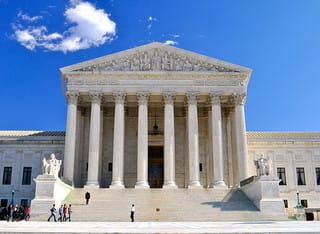Ten years after the U.S. Supreme Court upheld the constitutionality of the Cleveland voucher program, state judges are still sending conflicting signals about the viability of private school choice. The latest setback for choice proponents took place last week in Oklahoma, where a Tulsa County judge ruled that a voucher for students with special needs violated the state’s constitutional prohibition of public money for sectarian institutions.
 The U.S. Supreme Court's Zelner decision didn't end the fight for private school choice. Photo by TexasGOPVote.com. |
How can this be? The nation’s highest court declared in 2002’s Zelman v. Simmons-Harris that Cleveland’s voucher allowed parents to exercise “genuine choice,” leaving the decision to attend a faith-based school to the family, not to the state. The answer is in the wildly varying Blaine Amendments and compelled support clauses to constitutions in 47 states. And in many ways, these obstacles raise a larger hurdle than the Establishment Clause at issue in Zelman.
The capable attorneys at the Institute for Justice foretold the challenges in Oklahoma. The libertarian law firm, not one to shy from a school choice lawsuit, reported in a 2007 state-by-state analysis that the Oklahoma Constitution “would probably foreclose voucher legislation.” Oklahoma doesn’t distinguish between state aid to students and state aid to schools they attend, the institute said, and its supreme court struck down a relevant private school transportation law accordingly.
Of course, higher courts may reverse the decision from Tulsa Judge Rebecca Nightingale on appeal, and no doubt choice advocates would savor the chance to affirm the “genuine choice” that, indeed, comes with voucher legislation. But there are policy options that may stand more securely in states with even the strictest of Blaine interpretations.
The Institute for Justice believes the Oklahoma Constitution doesn’t preclude all private options. Tax credit scholarships may survive a challenge, just as they may in most states, because tax-credited funds are arguably no different than a contribution to a favored charity. In fact, IJ concluded that constitutions in only two states have Blaine interpretations so strict that they shut out the possibility for any private option—Michigan and Massachusetts.
Policy makers would be wise to consider these idiosyncrasies that vary state to state before designing programs that may only lead easily to disrupted educations afterward, just as it has done for 149 special-needs students in Oklahoma. Zelmannever ended the fight, even though it should have caused states to rethink what they so sweepingly consider “aid” to sectarian institutions. Vouchers and tax credit scholarships are different tools that achieve the same purpose. If states won't put the legacy of James Blaine to rest, then legislators need to figure out which tool gets the job done.
